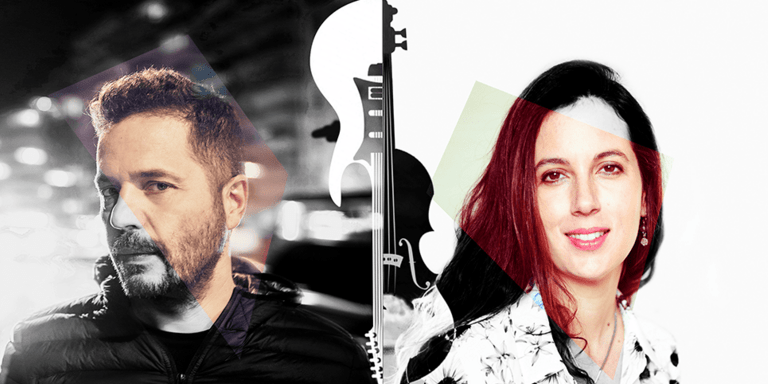
How did an Uruguayan opt to make music compatible with medicine and a Chilean woman combine her passion for opera with business administration? Both exemplify the synergies originated by the Orange Economy in Latin America and the Caribbean, a region where creative and cultural industries generated $124 billion in revenue and nearly 1.9 million jobs in 2015, according to Unesco.
A composition that affects the senses
"Creativity emerges as a fragile plant, but it ends up becoming a very clear and robust source of prosperity," says Daniel Drexler, Uruguayan musician and medical doctor, convinced of how enriching music has been for his career as a M.D. and neuroscience researcher.
"No two days alike," explains Daniel from his home in Montevideo, the capital of Uruguay. His time is split between medical consultations, neuroscience researches, rehearsals and music shows. For a long time he kept these passions hidden and separated to avoid being a victim of prejudice. However, this mix was precisely the one that allowed him to find a solution for tinnitus, a disease that generates annoying noises in the ears and affects between 10% and 15% of the world population, according to studies published by the NIH.
That is how Levo was born. This device allows for reprogramming of the brain and was conceived in Uruguay by Daniel and his colleagues, the PhD and Biologist Marisa Pedemonte, and the engineers Andrés Bianco and Darío Geisinger. This innovative product was awarded with the gold medal for Digital Health Products and Mobile Medical Apps, at the 2017 Annual Medical Design Excellence Awards, in New York City.
Deaf in one ear and with two ENT specialists as parents, tinnitus was always of great interest to Daniel. Thus, while recording a song, he noticed how high the snare drums was—a percussion instrument also known as side drum—but that his brain, after so many hours exposed to the sound was no longer listening to it.
"While fixing this issue in the studio, I was also working in the neuroscience laboratory studying the hearing system, and in a medical practice in hearing cases. That mixture allowed me to come up with the idea of treating tinnitus with the same sound heard by those who suffer from it,” says Daniel. “The idea was to reproduce this sound while the patients were sleeping, so the brain would consider it a redundant sound and reduce it, as it did with the snare drum, and it worked."
Today, Levo belongs to an American company dedicated to technology transfer called Otoharmonics Corporation, and it is already marketed in the United States, Canada and parts of Europe.
Hearing problems not only shaped Daniel’s life, but have also been a vital source of inspiration for his compositions. "There is no song that is not related to my work in medicine. In fact, I am sure that my assessment of emptiness, which is the name of the third studio album (or Vacío in Spanish), is due in large part to my work with patients who have tinnitus, who can not be silent," he explains.
“Creativity emerges as a fragile plant, but it ends up becoming a very clear and robust source of prosperity,” says Daniel Drexler.
Harmony in crescendo
At the southwestern end of the continent, in Santiago de Chile, Alejandra Martí explains her commitment to the fine arts: "For me, opera, ballet and music are much more than artistic expressions or cultural activities. They are a source of employment, social cohesion and education."
Alejandra never considered herself talented enough to be an artist, even though she studied piano and ballet when she was a child. However, she discovered her entrepreneurial spirit and a good nose for business at a young age, which is why she decided to bring both worlds together through cultural management. After studying Literature and Business Administration, she began working at the Gran Teatre del Liceu in Barcelona, Spain, and then at the Municipal de Santiago, in Chile.
Today, Alejandra is the executive director of Ópera Latinoamérica (OLA), a non-profit organization that brings together Ibero-American opera houses. They have a big challenge ahead: generate synergies to reduce the sector’s fragmentation and expand the offer of lyric art in the region to reach more people.
Her first task has been to bring together all the shareholders of this ecosystem to encourage collaboration, share best practices and make co-productions. Currently, OLA already has a network of 30 members in 11 countries. In its corporate governance are the Teatro Colon of Buenos Aires, the Theatro Municipal of São Paulo, the Instituto National de Bellas Artes of Mexico and the Teatro Real of Madrid, among others.
For a theater it can be very expensive to produce an opera and, therefore, there is very little to offer. "By working regionally, theaters can co-produce to save on scenery and costumes, and paying reproduction rights, which represents a much lower cost," explains Alejandra. This is how La Boheme, by Giacomo Puccini, was developed between the Teatro Colón, in Argentina and the Ópera de Tenerife, in Spain.
Opera can also have educational purposes; OLA's next challenge is called Palco Digital Infantil (Digital Children's Balcony) which seeks to bring lyric art to schools through live streaming. With this, Alejandra hopes to expand the market and end the myth that opera is only for elites.
An orange symphony
The creative economy is an opportunity for development and growth in Latin America and the Caribbean. In countries such as Uruguay, the creative sector represents 0.63% of the gross domestic product (GDP). Meanwhile, in Chile, it already represents 2.2% of GDP, according to IDB data.
However, for Daniel and Alejandra the promotion of the Orange Economy must be complementary to the investment in sciences and other disciplines. "You have to invest in art, because it allows us to think outside the box. But the crossing between arts and science is what helps us look at a problem from different angles to find innovative solutions. Without that we will be obsolete in no time," says Daniel.
Daniel and Alejandra will share their experiences along with other creatives and innovators from all over the world this Tuesday, December 11 in Demand Solutions Chile; follow them in our live streaming.

